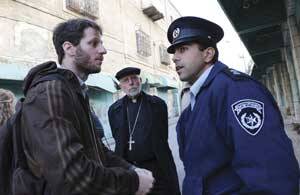Calling for justice for the peoples of the Holy Land, delegates of the Holy Land Coordination urged political leaders to be courageous in seeking a just peace in the region. The bishops, including Bishop Gerald Kicanas of Tucson, Ariz., said that despite the region’s deep wounds, “love and hope are alive” among the people.
“Peace with justice is within reach, but political leaders and all people of good will need courage to achieve it,” the 10 bishops said in a statement on Jan. 14 at the conclusion of the four-day Holy Land Coordination meeting. Mandated by the Holy See and organized by the Bishops’ Conference of England and Wales, the delegation meets every January in the Holy Land as a demonstration of solidarity with the resident Christian community.
The bishops urged both Palestinians and Israelis to support public officials who “take courageous initiatives for a just resolution of the conflict to reach a two-state solution, with security and recognition for Israel and a viable and independent state for Palestinians.”
“For us, this is not merely about politics; it is an issue of basic human rights,” the bishops said.
The bishops expressed concern about the growing distance between Israelis and Palestinians and the lack of human contact between the two, noting that such distance “undermines trust and dialogue.”
“The situation in the Holy Land is serious and of deep concern because it has regional implications, and it is critical the international community participate in the potential resolution of the conflict,” said Bishop Kicanas, vice president of the U.S. Conference of Catholic Bishops.
The bishops expressed concern over the increasing construction of Jewish settlements around Jerusalem. “There is continuing development of not only the Old City but also the historical basin area around the Old City, and the plans seem to be taking place without any discussion with Muslim and Christian authorities about their holy places,” said Bishop Kicanas.
Bishop Kicanas noted that at locations like the Mount of Olives, where the Jerusalem municipality recently approved construction of four new buildings, there are sites considered holy by both Jews and Christians. “The settlers are interested in [the Mount of Olives] because of the historic and religious meaning it has for Jews, and that is obviously important, but also in that area of the land the other faiths are important, too. Certainly the Mount of Olives is important in the Christian faith,” he said.
Auxiliary Bishop William Kenney of Birmingham, England, said the apparent lack of accountability in the planning of these projects circling Jerusalem is very disturbing. “The basic impression [from briefings] is that something is going on that is not transparent, and it sounds extraordinarily odd,” said Bishop Kenney. “Obviously it seems to be a campaign to make sure Palestinians leave East Jerusalem.”
Bishop Kicanas said his visit to Hebron, West Bank, with American Catholic university students on Jan. 13 brought clearly to the forefront a “fearful image” of what could happen if the two communities cannot reach “some mutual respect and understanding of each other.” He noted that both communities have suffered pain and loss, making reconciliation a very delicate and complicated process. “There are two peoples who have experienced great trauma now trying to come to understand each other, respect each other and trust each other,” he said, “which is not a small task.”








